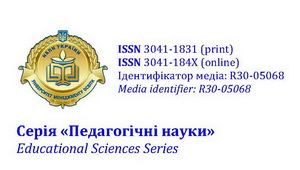Humanization of education as a priority of the contemporary pedagogical process
Анотація
Ключові слова
Повний текст:
PDF (English)Посилання
REFERENCES / СПИСОК ВИКОРИСТАНИХ ДЖЕРЕЛ
Ə. Ə. Əlizadə, H. Ə. Əlizadə, Pedaqoji psixologiya. Bakı, Azərbaycan : ADPU-nun nəşriyyatı, 2010.
R. İ. Əliyev, Humanist psixologiya. Bakı, Azərbaycan : ADPU-nun nəşriyyatı, 2023.
H. H. Əhmədov, N. E. Zeynalova, Pedaqogika. Bakı, Azərbaycan : Elm və Təhsil, 2019.
N. M. Kazımov, Milli pedaqogika yollarında. Bakı, Azərbaycan : OKA Ofset, 2004.
A. Nəzərov, Müasir təlim texnologiyaları. Bakı, Azərbaycan : ADPU, 2012.
Sh. A. Amonashvili, How Are You, Children? A Book for a Teacher. Moscow, Russia : Prosveshchenie, 1991. (російською).
D. S. Aizerman, Testing Trust. Notes of a Teacher. Moscow, Russia : Prosveshchenie, 2011. (російською).
V. P. Bezdukhov, Humanistic Focus of a Teacher. Samara, St. Petersburg, Russia, 2007. (російською).
M. N. Berulava, “Humanization of Education: Directions and Problems”, Pedagogy, No. 4, pp. 23–27, 2016. (російською).
E. L. Dubko, Ideal, Justice, Happiness. Moscow, Russia: Progress, 1989. (російською).
G. Richardson, Education for Freedom. Moscow, Russia, 1997. (російською).
A. A. Melik-Pashayev, “Humanization of Education: Problems and Possibilities”, Questions of Psychology, No. 5, pp. 11–18, 1989. (російською).
TRANSLATED AND TRANSLITERATED / ПЕРЕКЛАД, ТРАНСЛІТЕРАЦІЯ
А. А. Alizade, H. А. Alizade, Pedaqoji psixologiya. Baku, Azerbaijan : ADPU-nun nəşriyyatı, 2010. (in Azerbaijani).
R. І. Aliyev, Humanistic Psychology. Baku, Azerbaijan : Publishing House of the State Academic Polytechnic University, 2023. (in Azerbaijani).
H. H. Akhmedov, N. E. Zeynalova, Pedaqogika. Baku, Azerbaijan : Science and Education, 2019. (in Azerbaijani).
N. M. Kazımov, On the paths of national pedagogy. Baku, Azerbaijan : OKA Offset, 2004. (in Azerbaijani).
A. Nazarov, Modern teaching technologies. Baku, Azerbaijan : ASPU, 2012. (in Azerbaijani).
SH. A. Amonashvili, Kak dela, deti? Kniga dlya uchitelya. Moskva, Rossiya : Prosveshchenie, 1991. (in Russian).
D. S. Ajzerman, Ispytanie doveriya. Zapiski uchitelya. Moskva, Rossiya : Prosveshchenie, 2011. (in Russian).
V. P. Bezduhov, Gumanisticheskaya napravlennost' uchitelya. Samara, Sankt Peterburg, Rossiya, 2007. (in Russian).
M. N. Berulava, «Gumanizaciya obrazovaniya: napravleniya i problemy», Pedagogika, № 4, s. 23–27, 2016. (in Russian).
E. L. Dubko, Ideal, Spravedlivost', Schast'e. Moskva, Rossiya : Progress, 1989. (in Russian).
G. Richardson, Obrazovanie dlya svobody. Moskva, Rossiya, 1997. (in Russian).
A. A. Melik-Pashaev, «Gumanizaciya obrazovaniya: problemy i vozmozhnosti», Voprosy psihologii, № 5, s. 11–18, 1989. (in Russian).
Посилання
- Поки немає зовнішніх посилань.
